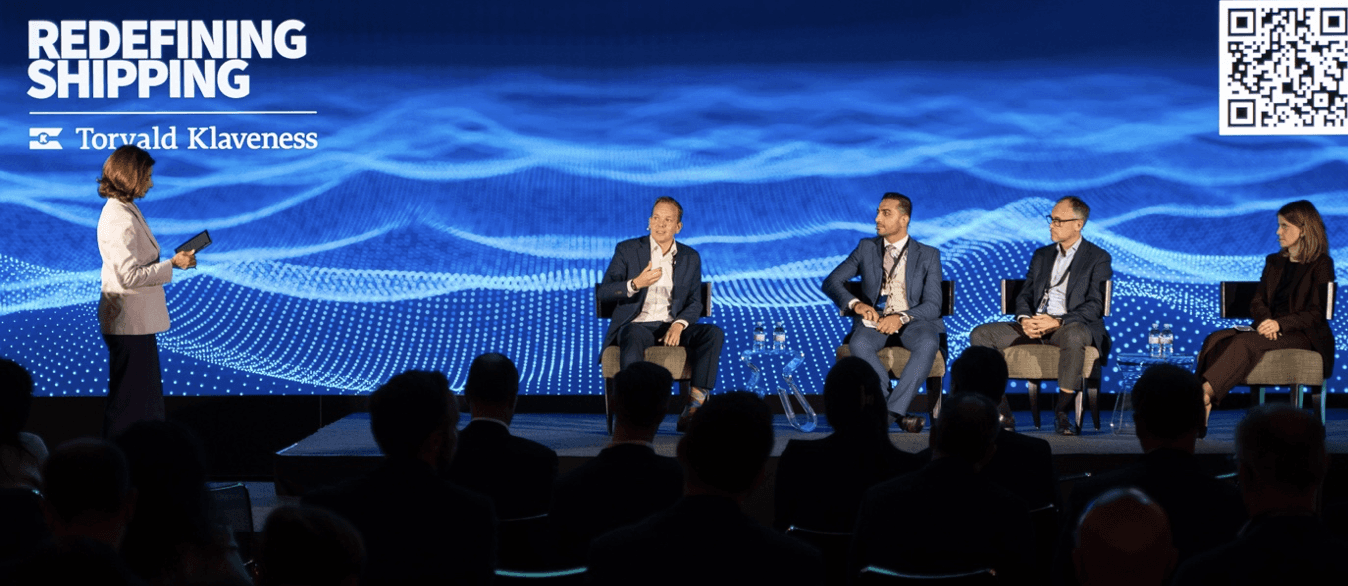
Redefining Shipping: A Roadmap to 2050 and Beyond
Posted
Thursday, November 21, 2024
Related stories
->
We're looking for a Senior Product Designer / UX Designer
->
Redefining Shipping: A Roadmap to 2050 and Beyond
->
Industry leaders coming together at the Klaveness Supply Chain Summit in Perth this week
->
CargoValue is about to get even smarter through its new interface
->
Proud to be part of a greener future at the Sea Cargo Charter's Annual Meeting
The discussions centered on how shipping can adapt to meet the twin demands of a growing global fleet and the need to eliminate carbon emissions by 2050. Achieving this goal requires a bold reimagining of supply chains, leveraging collaboration, innovation, and technology to drive meaningful change.
The Future of Efficiency
Group CEO Ernst Meyer set the tone with a stark reminder: inefficiencies in shipping are no longer just a cost issue—they’re a sustainability issue. Meyer outlined how low-carbon fuels, operational efficiency, and trading optimization must converge to tackle structural barriers while creating commercial pressure through mechanisms like carbon taxes.
He brought it into perspective for the end consumer: the cost of decarbonization is minimal—a loaf of bread might increase by just 5 cents—but the benefits for global supply chains are monumental.
Insights from the Panels
The first panel, featuring leaders from Alcoa, Hydro Aluminum, Klaveness Digital, and Klaveness Dry Bulk, highlighted how data-driven tools are lifting the “blindfold” off maritime supply chains. Conversations ranged from AI-driven decision-making to overcoming resistance to change, with one consensus: physical and digital innovation must go hand in hand.
Rahman Moayeri of Alcoa noted the transformative power of collaboration, even when skepticism around data sharing with shipping companies initially arose. Jonathan Hadley of Hydro Aluminum emphasized how AI can see beyond human capabilities, reshaping decisions that drive efficiency and resilience.
In the second panel, Raízen’s Leonardo Ferreira and KCC’s Engebret Dahm explored how aligning values and sustainability goals between cargo owners and shipping providers creates not just efficiencies but partnerships built to last. Ferreira shared how Raízen has quantified its efficiency gains with KCC, including a 40% reduction in carbon emissions and a 5% ballasting time.
The Takeaway
The event reinforced that redefining shipping isn’t just about meeting IMO decarbonization targets or adopting new fuels. It’s about reimagining supply chains as an interconnected ecosystem. Processes, business models, and technology must evolve in parallel to enable decarbonization while delivering competitive freight and resilient supply chains.
We have and will continue to consistently advocate for data-driven efficiency and innovation as the cornerstones of sustainable supply chains. Tools that enable transparency, predictability, and smarter decision-making aren’t just optional—they’re essential for companies navigating the complexities of modern shipping.
As supply chains become increasingly dynamic, events like these demonstrate the power of shared vision and collaboration. Together, we can not only meet the challenges ahead but also create opportunities that set a new standard for the maritime and cargo industries. Within the Klaveness Group, this commitment is reflected across our business units—whether through KCC’s groundbreaking innovations in trading efficiency and low-carbon operations or Klaveness Dry Bulk’s pursuit of operational excellence. These collective efforts illustrate how we, as one organization, are shaping the future of sustainable and resilient supply chains.
